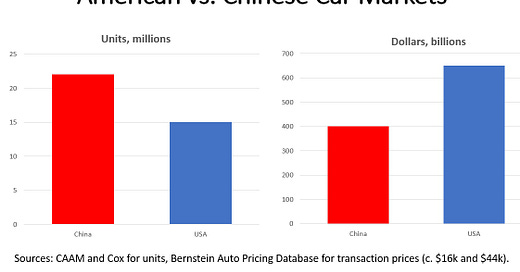(Insert here my usual disclaimer regarding thanks to my sources, etc.)
Those unfortunate enough to hear me speak at automotive events know I have A Problem with how our industry measures itself. We count units, not dollars: how many cars we sold, whether we’re an OEM or a dealer. Thus a Maserati counts the same as a Mini or a Mitsubishi. Few other industries do this: Walmart doesn’t announce in its earnings reports that they sold more socks than ever before: they talk revenue. Without dollars we don’t have revenue, and without revenue we don’t have profits, and thus continued existence of the business.
Does this matter? Of course: the metric you select drives your behavior. If you count units, you will try to sell more units, and pay less attention to revenue, and thus to profit. Right now the US industry seems to have woken up to the need to focus more on the bottom line than on cars shipped. We may backslide, however, back to the bad old days of deep discounts applied for no better reason than to end the year having sold just one more unit than our rivals.
But here’s an illustration of the distortions that can result when we choose different metrics. Everyone knows that China is the largest car market in the world, right? Well, yes, in terms of units. But when we multiply units by average transaction price we get revenue, and here the USA pulls clearly into the lead (trailing twelve months sales used here).1 It’s amazing what an average price 2.75 times greater (44/16) will do for you!
Am I trying to make a specific point about China? No. I am making a broader argument, that metrics matter, in that they impact perspectives, and perspectives shape actions. And our industry’s historic focus on volume metrics can be misleading, driving over-production, excess discounting, and profit destruction.
After all, remember what the single best selling vehicle in America - in units - was, in the 1990s? No, not Taurus, Not Accord.
It was this, the Little Tikes Cozy Coupe, which often moved 500,000 units annually… but generated only about $15 million in revenue. Many units, low profits. Metrics matter.
(It’s also zero emissions, by the way. Ahead of their time, Little Tikes.)
Time for your daily Dad Joke:
“I started saying mucho to my Hispanic friends. [wait… ] It means a lot to them.”
Your mileage may vary: price data is notoriously difficult to get, and even unit data is subject to revisions, and the vagaries of sales versus shipments versus registrations, etc. I’ve rounded numbers aggressively to show figures that I am sure are directionally correct, but I am also sure they are not precisely accurate.





